
-
 Carrick given Manchester derby baptism of fire, Frank in the firing line
Carrick given Manchester derby baptism of fire, Frank in the firing line
-
Trump announces 'board of peace' formed for Gaza

-
 Sam Darnold: the 'old soul' QB tipped to win Super Bowl
Sam Darnold: the 'old soul' QB tipped to win Super Bowl
-
One year on, it's all about Trump. But for how long?

-
 Australian snowboarder Brockhoff quits ahead of Winter Olympics
Australian snowboarder Brockhoff quits ahead of Winter Olympics
-
Bills battle Broncos as Allen eyes Super Bowl

-
 Magic rally to top Grizzlies in NBA Berlin game
Magic rally to top Grizzlies in NBA Berlin game
-
Venezuela's Machado says she 'presented' Trump with Nobel medal

-
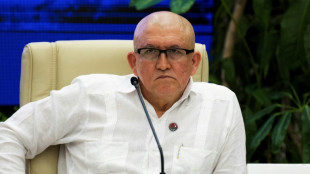 Key Colombia guerrilla group backs pact to fight US, commander tells AFP
Key Colombia guerrilla group backs pact to fight US, commander tells AFP
-
Chiefs' Mahomes targets NFL 'Week 1' after knee surgery

-
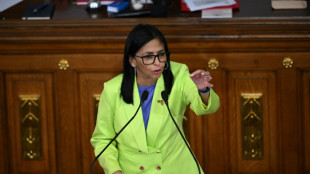 Venezuelan interim leader vows oil sector reform after Maduro ouster
Venezuelan interim leader vows oil sector reform after Maduro ouster
-
Social media sites block 4.7 million underage accounts in Australia

-
 US court clears Norway's Equinor to resume wind project halted by Trump
US court clears Norway's Equinor to resume wind project halted by Trump
-
Threats to Iran spike 'volatility': UN official
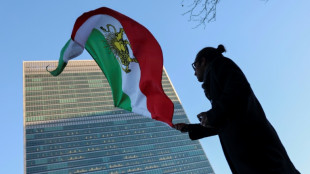
-
 Rabiot and AC Milan give Como French lesson to stay on Inter's heels
Rabiot and AC Milan give Como French lesson to stay on Inter's heels
-
US says reached deal with Taiwan to lower tariffs, boost investments

-
 South Korea's ex-leader Yoon faces first court verdict over martial law chaos
South Korea's ex-leader Yoon faces first court verdict over martial law chaos
-
'Gigantic explosion', fire in Dutch city of Utrecht, four hurt

-
 Twenty-six charged in latest basketball gambling scandal
Twenty-six charged in latest basketball gambling scandal
-
Venezuela's Machado meets Trump for 'positive' talks despite snub

-
 NBA Europe 'must respect tradition', says commissioner Silver
NBA Europe 'must respect tradition', says commissioner Silver
-
Thieves steal Pokemon cards in armed robbery at US store

-
 French Olympic champion Papadakis claims she was under partner's 'control'
French Olympic champion Papadakis claims she was under partner's 'control'
-
Fury over Grok sexualized images despite new restrictions

-
 US says Iran halts executions as Gulf allies pull Trump back from strike
US says Iran halts executions as Gulf allies pull Trump back from strike
-
Frank says Spurs taking 'small steps' in right direction

-
 Syrian activist Sarah Mardini acquitted of migrant trafficking in Greece
Syrian activist Sarah Mardini acquitted of migrant trafficking in Greece
-
Goldman Sachs' profits jump on hot merger market
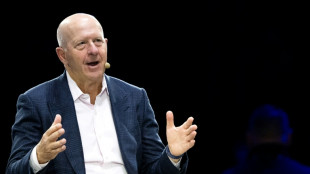
-
 Platini says Infantino has become 'more of an autocrat'
Platini says Infantino has become 'more of an autocrat'
-
Scottish Borders, Lake District to grace 2027 Tour de France

-
 Venezuela's sidelined Machado arrives at White House for Trump talks
Venezuela's sidelined Machado arrives at White House for Trump talks
-
French mother superior bullied nuns at Paris order: inquiry

-
 Cuba pays tribute to soldiers killed in Maduro capture
Cuba pays tribute to soldiers killed in Maduro capture
-
UK politician joins hard-right Reform just hours after Tories sack him
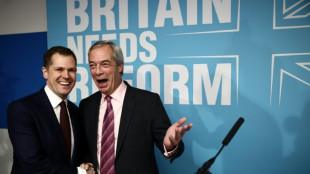
-
 'Gigantic explosion', fire in Dutch city, four hurt
'Gigantic explosion', fire in Dutch city, four hurt
-
French mother superior bullied nuns at Paris convent - inquiry

-
 Deprived of heating, Kyiv enters survival mode to beat big freeze
Deprived of heating, Kyiv enters survival mode to beat big freeze
-
Oil prices slump after Trump eases concerns over Iran

-
 French mother superior bullied nuns in Montmartre: report
French mother superior bullied nuns in Montmartre: report
-
Rosenior refuses to back Sanchez as Chelsea number one

-
 Harry due to testify to UK court next week in last tabloid case
Harry due to testify to UK court next week in last tabloid case
-
Trump threatens to invoke Insurrection Act over Minnesota protests

-
 Niger faces dilemma over uranium shipment stuck at airport
Niger faces dilemma over uranium shipment stuck at airport
-
UN chief attacks world leaders putting cooperation on 'deathwatch'

-
 Morocco and Senegal prepare for final showdown but Salah's AFCON dream fades
Morocco and Senegal prepare for final showdown but Salah's AFCON dream fades
-
Polls close in Uganda after delays, internet blackout

-
 Forced confession fears as Iran chief justice interrogates protesters
Forced confession fears as Iran chief justice interrogates protesters
-
Al-Attiyah closes on sixth Dakar Rally as Ekstrom wins 11th stage

-
 Luis Enrique has no doubts about PSG's title credentials
Luis Enrique has no doubts about PSG's title credentials
-
England off-spinner Bashir signs for Derbyshire after Ashes exile


Tech firms roll back misinformation curbs ahead of 2024 polls
As a global election season widely expected to be mired in misinformation and falsehoods fast approaches, the big US-based tech platforms are walking back policies meant to curb them, stoking alarm.
Whether it is YouTube scrapping a key misinformation policy or Facebook altering fact checking controls, the social media giants are demonstrating a certain lassitude with being the sheriffs of the internet Wild West.
The changes have come in a climate of layoffs, cost-cutting measures and pressure from right-wing groups that accuse the likes of Facebook-parent Meta or YouTube owner Google of suppressing free speech.
This has spurred tech companies to loosen content moderation policies, downsize trust and safety teams and, in the case of Elon Musk-owned X (formerly Twitter), restore accounts known for pushing bogus conspiracies.
Those moves, researchers say, have eroded their ability to tackle what is expected to be a deluge of misinformation during more than 50 major elections around the world next year, not only in the United States, but also in India, Africa and the European Union.
"Social media companies aren't ready for the 2024 election tsunami," the watchdog Global Coalition for Tech Justice said in a report this month.
"While they continue to count their profits, our democracies are left vulnerable to violent coup attempts, venomous hate speech, and election interference."
In June, YouTube said it will stop removing content that falsely claims the 2020 US presidential election was plagued by "fraud, errors or glitches," a move sharply criticized by misinformation researchers.
YouTube justified its action, saying that removing this content could have the "unintended effect of curtailing political speech."
- 'Era of Recklessness' -
Twitter, now known as X, said in November it would no longer enforce its COVID misinformation policy.
Since billionaire Musk's turbulent acquisition of the platform last year, it has restored thousands of accounts that were once suspended for violations including spreading misinformation and introduced a paid verification system that researchers say has served to boost conspiracy theorists.
Last month, the platform said it would now allow paid political advertising from US candidates, reversing a previous ban and sparking concerns over misinformation and hate speech in next year's election.
"Musk's control over Twitter has helped usher in a new era of recklessness by large tech platforms," Nora Benavidez, from the nonpartisan group Free Press, told AFP.
"We're observing a significant rollback in concrete measures companies once had in place."
Platforms are also under pressure from conservative US advocates who accuse them of colluding with the government to censor or suppress right-leaning content under the guise of fact-checking.
"These companies think that if they just keep appeasing Republicans, they'll just stop causing them problems when all they're doing is increasing their own vulnerability," said Berin Szoka, president of TechFreedom, a think tank.
For years, Facebook's algorithm automatically moved posts lower in the feed if they were flagged by one of the platform's third-party fact-checking partners, including AFP, reducing the visibility of false or misleading content.
Facebook recently gave US users the controls, allowing them to move this content higher if they want, in a potentially significant move that the platform said will give users more power over its algorithm.
- Hot topic -
The hyperpolarized political climate in the United States has made content moderation on social media platforms a hot-button issue.
Earlier this month, the US Supreme Court temporarily put on hold an order limiting the ability of President Joe Biden's administration to contact social media companies to remove content it considers to be misinformation.
A lower court of Republican-nominated judges had given that order, ruling that US officials went too far in their efforts to get platforms to censor certain posts.
Misinformation researchers from prominent institutions such as the Stanford Internet Observatory also face a Republican-led congressional inquiry as well as lawsuits from conservative activists who accuse them of promoting censorship -- a charge they deny.
Tech sector downsizing that has gutted trust and safety teams and poor access to platform data have further added to their challenges.
"The public urgently needs to know how platforms are being used to manipulate the democratic process," Ramya Krishnan, from the Knight First Amendment Institute at Columbia University, told AFP.
"Independent research is crucial to exposing these efforts, but platforms continue to get in the way by making it more costly and risky to do this work."
Q.Bulbul--SF-PST




